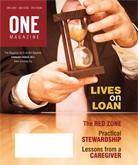
February-
March 2011
Lives on Loan:
The Importance of Christian Stewardship
E-Reader
----------------------
|

brown on green, A Regular column about finances
by David Brown
Estate Tithing
Tithing on your estate is the practice of giving a tithe on the estimated value of your estate. Two different methods could be used to do this. The most frequent is to make a bequest in your will. Your executor could choose to liquidate your estate and give 10% to the Lord’s work, or he or she could choose a particular asset that is equal to 10% of the estate and transfer that asset to the chosen ministry. Some assets have higher tax consequences for heirs, making them strategic bequests.
Another way to tithe on your estate is to transfer cash or specific assets to fund a planned gift while you are still living. Making a gift this way carries many benefits for the donor such as a partial tax deduction or a lifetime income. Upon your death, the tithe principle will go to the Lord’s work.
In either case, choose the gift that is most tax advantageous. Assets such as retirement accounts and IRA accounts have the highest tax liability to an heir, and therefore are the best assets to use for a bequest. Highly appreciated assets are best to use for planned giving.
Your estate gift can be distributed in one of two ways. You can choose for the tithe of the estate to be a lump sum immediately available to the ministry. Perhaps a better choice is to direct the tithe into an endowment, which will make your gift perpetual until Jesus returns.
Endowments have their roots in the Old Testament. It is God’s intention that His people become managers of the property He gives them. His law is, “live off the land, but do not consume it.” Like the land of ancient Israel, endowment gifts are preserved so the principal is never consumed. While earnings are harvested to support the Lord’s work, the original gift remains in place perpetually to earn income.
An endowment for your estate tithe gift enables you to continue giving to the Lord even after death. Remember, in addition to tithing on your income, you should give a tithe of your accumulated assets to the Lord’s work. The Foundation can help with a free Wills Guide. You can contact us for information about endowments or a planned gift that can benefit you during your lifetime and Free Will Baptist ministries after you have gone to your reward.
|
|

